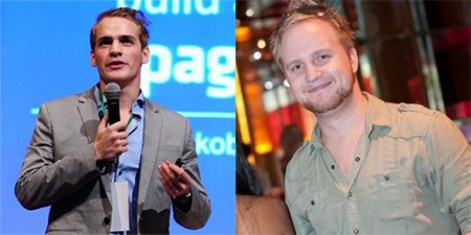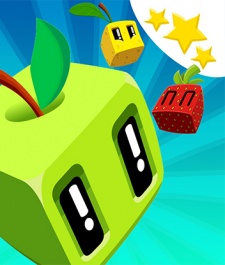What's drawing developers to the Rovio Stars publishing platform?
The morning after Supercell's Slush party in Helsinki, we caught up with the men behind one of the studios currently plugged into Rovio's latest venture, Jakob Lykkegaard and Thomas Andreasen of Pocket PlayLab.
After acquiring a 15-strong team initially focused on Facebook development, Lykkegaard and Andreasen began pushing Pocket PlayLab towards the world of mobile, with the fruits of that labour Juice Cubes picked up by the Angry Birds outfit.
So, what do Lykkegaard and Andreasen make of the studio's transition, what's their relationship like with Rovio, and is it possible now for indies to go it alone without the aid of a publisher? We took the two men to task:
Pocket Gamer: So, you guys are the entrepreneurs? Is that your role?
Thomas Andreasen: We're the business side of things. Of course we also have a lot of technical undertsanding.
Jakob Lykkegaard: So Thomas had a development studio. I just sold my company Pagemodo. So there then came an opportunity to take over a gaming team.
TA: The team had been working on Facebook games before, over the last three years before that, and then we decided to transfer them onto mobile.
JL: And we actually ended up closing down the application development business.
As entrepreneurs, why did you want to get into games?
TA: This was two years ago when we made the decision. We saw Facebook dramatically fall hard, and we thought 'the next thing is going to be mobile', and saw that mobile and tablet was coming up, so we thought 'if we're going to do games, consoles and stuff, we just didn't have belief in that market and our capabilities of creating that.
JL: Games in mobile going up, nobody couldn't see that coming.
What are the challenges you guys face with making contact with people on a global scale?
JL: Since we are based in Bangkok, it is sometimes difficult to make contacts, but for example, with Rovio, they contacted us after finding our game [Juice Cubes] on a test market. We do a lot of Skype calls and meetings, not that many conferences...
TA: Once they [potential partners] spot us in the charts, they go 'okay, these guys are interesting to talk to', and then they contact us.
Left to right, Jakob Lykkegaard and Thomas Andreasen
JL: The problem for us is that there aren't that many outsourcing studios for us in Bangkok, we're probably the only independent games studio being profitable. So we're building it up and want to be the only company in that region that you want to work for if you want to work in gaming.
Some issues are that basically no one around us has worked on a game this big, or servers that scale this much, so we also hire a lot of foreigners.
They teach all of our developers how to build things that last and make them bigger. Because we do have great development talent and great artists, it's just about having the scale and fitting everything into a small device.
You talk about making a product last, and I'm sure you're going to want Juice Cubes to last a very long time. How do you keep a game fresh and relevant for an audience you already have?
JL: In Juice Cubes we have a lot of levels, we're making one new level every day, and getting them launched every two weeks. So we're trying that. Making more levels, more obstacles so people face new challenges, we change the art.
Right now we have developed five worlds, but there's only two worlds in the game.

TA: In the market, how it is right now, content is king.
You're the first third-party free-to-play game to come out of Rovio Stars Rovio itself traditionally tied to premium releases. How does it feel to helping one of the biggest companies in mobile transition to F2P?
JL: It's fun to actually release it with Rovio, and see that they do have a lot of experience. They just added those last details to the game that made it better for the users, and helped keep the quality up. Plus we've been learning a lot from them.
But from our side, we're actually teaching them a lot about freemium, about how to acquire users. Because Rovio games are based around the fact that they launch a game, and everybody downloads them.
They're at the top of the charts, they do a little marketing, no user acquisition, and that's where our side comes in, you know?
So it's a two way street? What sort of things do you get to teach Rovio?
TA: I think it's mostly that they have different campaigns - user acquisiton-wise - but it's not something that they've actively done before. And I think this is one of the first titles [for them] where it makes financial sense. So it's a good learning process for them, but also for us.
JL: We're teaching them a bit about user acquisition, making it better. And then they're teaching us about how to make the game better.
TA: They make great product, they're product guys by far. They know how to optimise product. They've got all the processes in place. Where we're more on the, I think, marketing side. They've helped us polish off Juice Cubes.
JL: We had Juice Cubes live for about four months in Australia and other countries before, and we spent a lot of money on user acquisition, finding the right campaigns and the right tools to do it, and then now we're just replicating it worldwide with Rovio.
And as I said earlier, that's how they found us. They were like 'hey, this game is doing really well in New Zealand, we should contact them'.
There's been a bit of chat recently at Slush with many developers suggesting the independent studio is dead. What's your take?
TA: It depends how well funded an independent studio is. Most people end up going with a publisher because they don't have the finances to spend two or three million dollars on user acquisiton. Not a lot of independent game studios can do that.
It is very much the big guys in the industry that are so dominating in the charts, because they have these possibilities that many studios don't have. But then again, if you have the right product, finding the money is not so much of a problem.
JL: I think organic successes and viral successes are done. Everything to get in the charts now is pure user acquisiton, and if your game's profitable enough to do that, you win. If not, you're dead.
Thanks to Jakob and Thomas for their time.





















